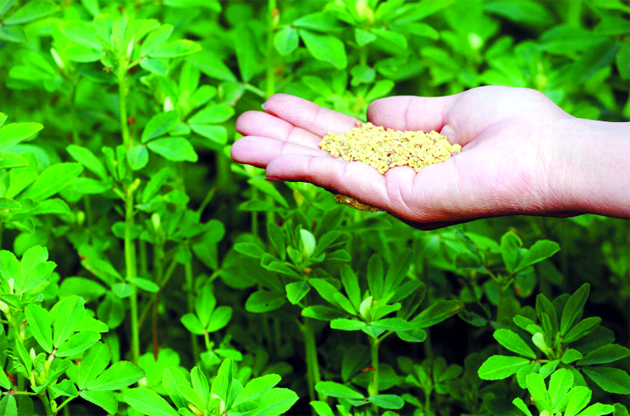Prof. (Dr.) R.D. Gupta
Fenugreek is extensively grown as an important cash crop in India. Its leaves and young pods are used as vegetable and the seeds are utilized as condiment / spice. As Fenugreek leaves are very rich in minerals and vitamins and therefore, these are used as medicines. Fenugreek thus, has abundant usage related to cooking and medicinal purposes, not only in India but also in other countries as a basic and the most important ingredient in culinary uses as well as in preparing medicines.
Medicinal Values:
A powerful herb, bitter in taste, has proved to be good for diabetes. It is considered to be cooling in effect, mildly laxative and restores digestion abilities. Gargling with water in which the leaves have been soaked heals, mouth ulcers. It is a quick remedy for sore throat.
Anemic patients can get a rich and natural source of iron in fenugreek leaves. A paste of the leaves alleviates burning sensation when applied on palms and ankles as well as soles. The paste is good for healing, swellings, sprains and burns.
A cup of fenugreek leaves paste and coconut milk applied over the scalp helps to prevent hair loss and promote hair growth. When it is combined with vinegar, it becomes a good source of eradicating dandruff. Apart from the above, use of fenugreek leaves prevents constipation, removes indigestion and stimulates the functions of spleen and liver. The leaves and shoots of fenugreek are very rich in protein, minerals and vitamins especially vitamins A and C.
Botanical Description:
Fenugreek is a herb which belongs to the Family “Leguminosae”. It has small white flowers and light green coloured leaves. It is mainly cultivated in the Middle East, North Africa, India and Egypt. An overage fenugreek plant grows upto 60 to 90 cm tall. The seed pods of this plant contain about 10 to 20 yellowish brown, aromatic and pungent smelling seeds.
Cultural Practices:
Climatic requirement: Fenugreek can be grown under a wide range of climate. However, it requires cool climate and can tolerate frost and freezing weather. Fenugreek also needs dry weather during maturing period. The areas where rains are heavy and continuous, growing of this crop should be avoided.
As Food item
* The vegetables especially leafy ones are known to be the cheapest source of natural protective foods. As fenugreek being leafy vegetable, it has been considered to be the essential food in the balanced diet, so it must be included in the essential food.
* Fenugreek like other leafy vegetables has proved beneficial for neutralizing the acids produced during digestion of cheese, meat, eggs and other oily foods. In light of the above, it is suggested that non vegetarians must include fenugreek vegetable in their diet.
* In countries like India where most of the people are vegetarian, use of vegetables including fenugreek, is very essential to meet the body requirement.
Impact points to remember:
* The women in India, like in many other developing countries, are silent workers labouring hard from down to dusk in the interests of their farms and homes. However, they get little opportunities to learn about improved farm methods and technological skills. They are therefore, required to impact trainings in various fields including vegetables of various kinds including those of leafy ones like fenugreek, spinach, etc. Medicinal importance of vegetables must be the main subject / topic to discuss.
* Eat steamed freshly brought vegetables. Green leafy vegetables fenugreek may be balanced for Vata dosha by cooking with ginger, cumin, coriander and asafoetida.
(The author is Ex- Associate Dean Cum Chief
Scientist KVK Jammu, SKAUST-J)


